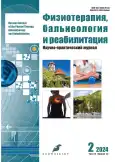Effects of general magnetic field therapy in comprehensive medical rehabilitation on the quality of life of patients with breast cancer
- Authors: Evstigneeva I.S.1
-
Affiliations:
- Russian Medical Academy of Continuous Professional Education
- Issue: Vol 23, No 2 (2024)
- Pages: 101-110
- Section: Original studies
- URL: https://journal-vniispk.ru/1681-3456/article/view/272303
- DOI: https://doi.org/10.17816/rjpbr627526
- ID: 272303
Cite item
Abstract
BACKGROUND: The Short Form-36 (SF-36) is one of the most widely used tools to assess quality of life in breast cancer patients. According to MEDLINE, the SF-36 is used in 95.0% of research studies to assess the quality of life in various diseases. Advantages of SF-36 include wide availability, ease of use, and high validity.
AIM: The aim of the study was to evaluate the effect of general magnetic field therapy in comprehensive medical rehabilitation on the quality of life parameters using a SF-36 questionnaire in breast cancer patients at 2–4 days and 1.0–1.5 months after surgery.
MATERIALS AND METHODS: A randomized, placebo-controlled study was conducted in patients (n=107) after surgery for breast cancer. All patients were divided into three groups balanced by age and clinical and functional parameters, and received a course of medical rehabilitation which included individual postoperative sessions of exercise therapy (posture treatment; movement therapy with breathing, general stimulating, special, and relaxation exercises; sensorimotor training using a biofeedback simulator; individual sessions with a medical psychologist; one session of instrumental physiotherapy). Comprehensive medical rehabilitation included fluctuating current therapy in group 1 (n=35), local magnetic field therapy in group 2 (n=35), and general magnetic field therapy in group 3 (n=37).
RESULTS: Analysis of quality of life parameters in the early postoperative period demonstrated effectiveness of the comprehensive physical rehabilitation program using exercise therapy, balance boards, and sessions with a psychologist in combination with one of the physical treatment options. Positive results increase patients’ confidence in the success of their rehabilitation. After providing the general magnetic field therapy in comprehensive medical rehabilitation, most of the SF-36 quality of life parameters improved, which indicates the beneficial effects of the general magnetic field on situational and personal anxiety, asthenic and vegetative manifestations, and sleep, as well as prolongation of these effects. Patients who received fluctuating current therapy as part of medical rehabilitation improved their pain index and physical function, probably due to analgesic and anti-inflammatory effects of this treatment option.
CONCLUSION: Comprehensive physical rehabilitation combined with physical therapy increases the patient’s independence in daily living, self-care, and mobility.
Full Text
##article.viewOnOriginalSite##About the authors
Inna S. Evstigneeva
Russian Medical Academy of Continuous Professional Education
Author for correspondence.
Email: evstigneevais@mail.ru
ORCID iD: 0000-0001-9128-0965
SPIN-code: 5163-7726
MD, Сand. Sci. (Medicine), Associate Professor
Russian Federation, MoscowReferences
- Evstafeeva EA, Ponomareva IV. Quality of life and its relationship with basic beliefs of women with breast cancer at different stages of the disease. Uchenye zapiski Krymskogo federal’nogo universiteta im. V.I. Vernadskogo. Sotsiologiya. Pedagogika. Psikhologiya. 2022;(1):97–104. EDN: FYOPPD
- Pusic AL, Cemal Y, Albornoz C, et al. Quality of life among breast cancer patients with lymphedema: A systematic review of patient-reported outcomes. J Cancer Surviv. 2018;(1):83–92. EDN: ZXBKBA doi: 10.1007/s11764-012-0247-5
- Carretti G, Mirandola D, Maestrini F, et al. Quality of life improvement in breast cancer survivors affected by upper limb lymphedema through a novel multiperspective physical activity methodology: A monocentric pilot study. Breast Cancer. 2022;3(29):437–449. EDN: RPIKQV doi: 10.1007/s12282-021-01322-0
- Evstafeeva EA, Ponomareva IV, Tsiring DA, et al. Psychological characteristics and quality of life of women with breast cancer. Bulletin Chelyabinsk State University. Education Healthcare. 2020;(2–3):11–15. EDN: FZHPJD
- Turk KE, Yilmaz M. The impact of mastectomy on quality of life and body appearance among breast cancer survivors. Eur J Breast Health. 2018;14(4):205–210. (In Russ.) doi: 10.5152/ejbh.2018.3875
- Chervinets YuV, Harmonova NA, Murashova LA, et al. Empirical study of indicators of life quality and reflection level in women with benicn and malignant breast tumors. Sovremennye problemy nauki i obrazovaniya. 2020;(4):129–135. EDN: ZZQXOY doi: 10.17513/spno.30048
- Klernäs P, Johnsson A, Boyages J, et al. Quality of life improvements in patients with lymphedema after surgical or nonsurgical interventions with 1-year follow-up. Lymphat Res Biol. 2020;18(4):340–350. doi: 10.1089/lrb.2018.0065
- Kluge VA, Semiglazova TY, Krivorotko PV, et al. Experience of application of the international classification of functioning (ICF) in assessment of the need for rehabilitation of patients with operated breast cancer. Bulletin Rehabilitat Med = Vestnik vosstanovitelʹnoj mediciny. 2021;(1):70–83. EDN: MFBKQP doi: 10.38025/2078-1962-2021-20-1-70-83
- Orekhova EM, Konchugova TV, Kulchitskaya DB, et al. Modern approaches to the use of neurotropic physical therapy in arterial hypertension. Voprosy kurortologii, fizioterapii i lechebnoi fizicheskoi kultury = Problems Balneol Physiother Exercise Ther. 2016;93(3):53–55. EDN: VZLSJF doi: 10.17116/kurort2016353-55
- Abuseva GR, Antipenko PV, Arkov VV, et al. Physical and rehabilitation medicine. National guidelines. 2nd ed, revised and updated. Moscow: GEOTAR-Media; 2023. 910 р. (In Russ.) EDN: STQNKB
- Handberg C, Thorne S, Maribo T. When a policy decision meets practice realities: The case of cancer survivorship care and rehabilitation needs assessment. Eur J Oncol Nurs. 2018;33:70–77. doi: 10.1016/j.ejon.2018.01.010
- Korchazhkina NB, Goloborodko EV, Kapitonova NV, Petrova MS. Application of complex non-drug methods in chronic fatigue syndrome. In: Sanatorium-resort health improvement, treatment and rehabilitation of patients with socially significant and occupational diseases. Sochi; 2012. P. 105–107. (In Russ.) EDN: TJBLRH
Supplementary files







